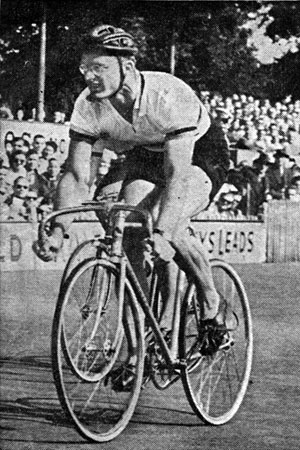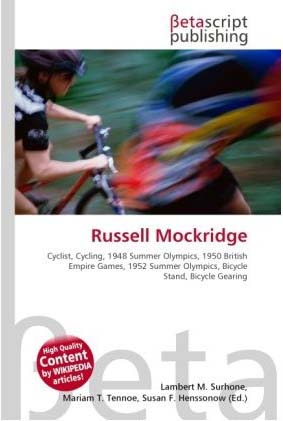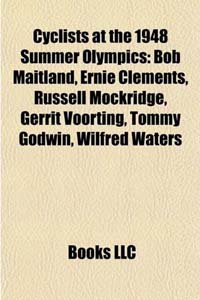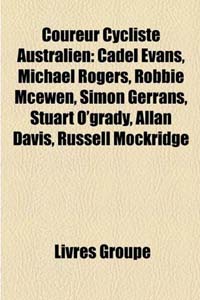|
 Golden Book of Cycling 1953 entry Golden Book of Cycling 1953 entry
“THE versatile Australian, Russell Mockridge, will always be remembered as the amateur with the unique distinction of having beaten the world's leading professional sprinters in the Grand Prix of Paris. This achievement alone entitles Mockridge to a high place in cycling history but that is also his due for other brilliant performances that made him a world-renowned rider from 1950.
In New Zealand that year he won the Empire Games 1,000 yards sprint and 1,000 metres time trial championships from Sid Patterson, the reigning world amateur sprint champion, and Mockridge was second in the 4,000 metres pursuit. In Italy in 1951 he was second in the world's amateur sprint championship and in Finland, in 1952, won two gold medals in the Olympic Games, breaking Olympic record by winning the 1,000 metres time trial in 1 min. 11.1 sec. and pairing with L. Cox to take the tandem title to his country. After that he reached the semi-final of the world's amateur sprint championship in Paris.
His Grand Prix triumph preceded his Olympic successes. This historic charity race fixture provided amateurs with their greatest opportunity of the year as, in addition to their own restricted event, they could compete with the professionals. Mockridge, easy winner of the amateur Grand Prix. seized the chance to cause the biggest sporting sensation of years against the professionals, winning the final from Derksen, of Holland, and the world's champion, Harris, of England. The amateur Grand Prix in 1953 resulted in another Mockridge triumph.
Club: (English) Upper Holloway C.C.
Age: 25.
Date: August 12, 1953”
Update 20-Apr-2011 - Scans of pages from the Golden Book of Cycling are now online at the Pedal Club
|
|
 MOCKRIDGE KILLED IN ROAD RACE MOCKRIDGE KILLED IN ROAD RACE
Tragic Death of Great Australian All-rounder
Credit: Cycling 17-Sep-1958
RUSSELL MOCKRIDGE, one of the greatest all-round riders the world has ever known, was killed on Saturday while competing in a road race in his native Australia. Two miles after the start of the 140-mile Tour of Gippsland, near Melbourne, he is reported to have been riding in a group when he swerved to avoid a car. His wheels apparently skidded on the wet road and he fell in front of a bus. Another rider in the group, J. Taylor, broke a collarbone in collision with the bus. The other four men in the group withdrew from the race, which continued. Mockridge's wife, whom he married in England, and his two year-old daughter, were following the race.
Russell Mockridge was the only man to have won the amateur and professional Grand Prixs of Paris in the same year, when racing as an amateur. In the same year as that astounding achievement, 1952, he was also a double Olympic gold medal winner, taking the kilometre time trial and, with L. Cox, the tandem sprint in Helsinki. Although he never managed to win a world championship, in the years following his arrival in Europe in 1951 he was a tremendous force to be reckoned with in almost every kind of track race, and was a popular rider with British track crowds.
Mockridge began his career as a roadman in Australia. He turned professional in 1953 and after two years of indifferent showing as a paid trackman, he returned to the road, finishing in the greatest road race of all, the Tour de France, in the same year of England's first full participation, 1955.
Of recent years, following his marriage, Mockridge has remained in Australia, and it might well be said that there, on the track and particularly on the road, he has been almost consistently the top professional, with a host of victories to his credit.
A quiet and serious-minded man, with the dedication to his chosen sport that marks the true champion, his death in such tragic circumstances will be a great blow to the game and its devotees in Australia. As fellow-countryman Dick Ploog said of him at Herne Hill on Saturday, he was a "true gentleman".
|
|
World of Russell Mockridge
Credit: Keith Bowden, Cycling, 12-Oct-1960
On a Saturday morning in September, 1958, while riding in a comparatively minor Australian road race, Russell Mockridge collided with a bus at an intersection in a Melbourne suburb. He was killed instantly.
Four months previously Mockridge had started to write a book. It was a thing he had always wanted to do. At the age of 30 he had gathered more than enough material. With the assistance of John Burrowes, a young Scottish journalist settled in Australia, Mockridge had almost completed the story of his life as a racing cyclist when, so suddenly and so tragically, he died. The book was completed by Burrowes, with help from Mockridge's wife, Irene, whom he married in London, and has now been published in Britain by Stanley Paul and Co. Ltd (178-202 Great Portland Street, London, W.1), price 21s. [Ed - original copies have been seen offered at over $1,000]
Mockridge has called his story "My World on Wheels". It is, without doubt, the most ,complete, honest and spell-binding account of modern big-time cycle racing I have come across. But it is a whole lot more than that. It is the story - frank, human, analytic and altogether fascinating - of one of the greatest and most complex personalities cycle-racing has ever known.
Read this book and you will know more than you are- ever likely to know about what makes professional bike-racing tick short of living with it. Read this book and you will know what made Mockridge tick.
Mystery Man
Russell Mockridge remained, throughout his sensational and almost fantastically unorthodox career, a mystery. As a bike-rider he was unquestionably great - among the world's greatest. No one ever really "got next to" Mockridge in Europe ; few in Australia. And it was this aspect of him, many experts believed, this unusual-temperament, that held him back from even greater achievements, from becoming one of the world's immortal pedallers. One realizes, however, after reading his story that probably it was his premature and tragic death that did this.. For, as he grew older and generally more mature, Mockridge changed. It is a very different man with a very different philosophy who returns in 1955 to success in Australia on the road as a professional, from the boy who left for the first time in 1948, London bound for the Olympics.
Mockridge tells his story chronologically, and the early chapters describing his first contacts with cycling, his introduction to racing via the road in Australia, and his thoughts and doubts about a sport into which he had more or less drifted, are not the least interesting. Mockridge came of well-to-do parents and was well educated. Despite his tremendous physical endowments, he was always a thinker and often a dreamer, and he never really fitted in to the "mateship" of the rough and tough Australian bike-game, particularly as an amateur.
In fascinating detail his book tells the story of his early racing, when victories came easily, and of his Australian road championship win; his complete rawness, particularly in mechanical matters (a lasting trait); his first job, on a newspaper; his first trip to Europe for the Olympic and world championship road races in 1948.
Back in Australia things happened rapidly. He left home, took a job with a cycle concern, took up track racing, and took on a college course for matriculation! There came a knee injury which almost finished his cycling career, but he won all the five Australian track championships he entered, to guarantee himself a place in the 1950 Empire Games team. But was cycling really what he wanted to do ? He wasn't sure. He decided that he Would retire after the Games and study to enter the church. This he did, despite winning the Empire Games sprint title.
By July, 1951, Mockridge was back in the saddle - and back in Europe, to contest the world sprint championship! And from here on the story changes. Part two of Mockridge's book opens with his arrival in London in March, 1952; it is the ensuing chapters that hold greatest interest for English readers.
Sitting cosily by the fire in winter, most of us have dreamed of one day leading the life of the Continental professional racing cyclist. Here it is, in absorbing, unglamorized detail.
Mockridge won both the amateur and amateur-professional Grands Prix of Paris in 1952 - a sensational feat - and kilometre time trial and tandem gold medals at the Helsinki Olympics. He decided to turn professional.
Page 82 of his 235-page book opens with “In March, 1953, I boarded the Orcades for London, and a third attempt to become a world track champion". Page 179 tells of his feelings upon leaving Europe at the end of the 1955 professional road racing season. The intervening pages are the story of hardship, marriage, his first six-day, hardship, road racing in Belgium, hardship, victory in the Paris "six", hardship, his switch to 100 per cent road racing, hardship, and then - perhaps the highlight of the whole book - his account of completing the 1955 Tour de France.
Nothing I have read quite so vividly portrays what professional racing on the Continent, and the Tour de France in particular, is really like for the man trying to make a living at it. Mockridge tells of his own feelings and reactions, and of his own development - his own story. But he also paints a brilliant picture of the sport on the Continent. Every plane has the searchlight shone squarely upon it. The freedom, the glamour, the good life of the successful pro. The suffering, the hardship, the doping, the "arrangements", the money. The arrangements, part of Mockridge's book tells of his highly successful career as both road and trackman upon his return to Australia, until the time of his death. Here is the hard-earned reward ; and here is the insight into the changes that his experiences have worked upon the man ; his new and more stable philosophy. The final chapter is John Burrowes' completion of the story, and this is followed by a number of tributes to Mockridge. There are interesting forewords to the book, and the illustrations are well-chosen.
Altogether "My World on Wheels", by the late Russell Mockridge, is a book that no enthusiast should miss, and will make fascinating reading even for the uncommitted.
.
|



 Golden Book of Cycling 1953 entry
Golden Book of Cycling 1953 entry MOCKRIDGE KILLED IN ROAD RACE
MOCKRIDGE KILLED IN ROAD RACE Scam Alert!
Scam Alert!




